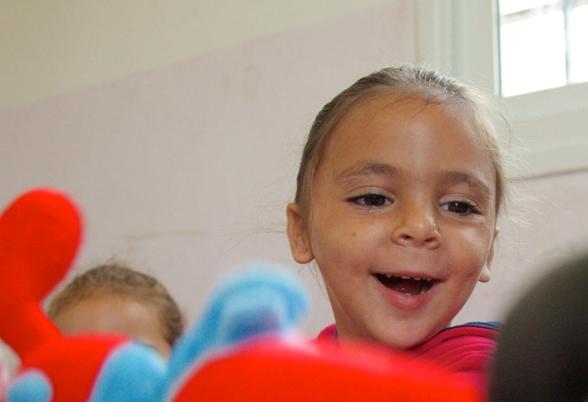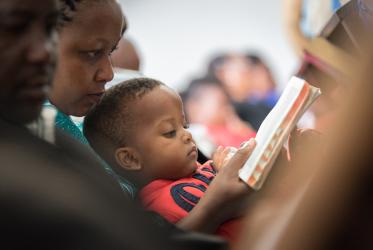A plenary discussion on support by religious communities for the rights of children, and a first draft of the statement of “principles for child-friendly churches,” captured the imagination of the Central Committee of the World Council of Churches (WCC) on 27 June. The document will now undergo further revision and be resubmitted at the next WCC executive committee meeting.
The child rights plenary was moderated by Central Committee member Martina Viktorie Kopecká of the Czechoslovak Hussite Church and moderator of the WCC ECHOS youth commission. She explained that the on-going work on children’s rights has evolved from ecumenical conversations and a working group active during the 10th Assembly of the WCC held at Busan, Republic of Korea, in the autumn of 2013.
A high point in the ensuing process was the signing in September 2015 of a global partnership agreement between the WCC and UNICEF, the United Nations Children’s Fund.
Principles for child-friendly churches
The Central Committee heard a series of presentations by representatives of WCC member churches and ecumenical partner organizations, UNICEF and the Global Partnership to End Violence against Children.
Masimba Kuchera of Zimbabwe worked jointly with UNICEF as a member of the Commission of the Churches on International Affairs in the development of three principles for child-friendly churches. He explained that the WCC commission was concerned that a firm theological foundation undergird the principles and that the voices of children be heard throughout the process.
Catarina Tino, partnerships specialist from UNICEF, reported that a constellation of consultations was arranged internationally in church and ecumenical settings, involving a total of 144 young people, mostly between the ages of 11 and 18.
The comments and many contributions of youth were taken into account at an April 2016 drafting session in Geneva. Drafters were also informed by the observation of the WCC’s theological working group on the Pilgrimage of Justice and Peace that “taking care of children in need is an integral part of seeking justice and peace.”
The principles for child-friendly churches encourage Christian congregations and agencies to:
• Celebrate the many gifts we receive through children and the role played by churches throughout the centuries in protecting and nurturing them;
• Visit the many wounds in the lives of children and in our failure to address their basic needs;
• Participate in joint efforts to transform injustices into acts of justice.
Without violence
Sabine Rakotomalala recounted her work with the Global Partnership to End Violence against Children, and she shared exciting informational resources that are available through the hashtag #withoutviolence and the website www.withoutviolence.org.
She hailed the UN adoption in September 2015 of Sustainable Development Goal 16.2, pledging to “end abuse, exploitation and trafficking and all forms of violence and torture against children.” The involvement of the WCC in supporting this goal, she said, could “really tip the balance” toward a successful outcome. Churches can provide inspiration for greater commitment.
“We need to start accelerating action,” she continued. “Our collaboration enables us to do together what no government or agency could do alone.”
Best practices from diverse settings
The plenary presentations concluded with personal testimonies to programmes among member churches and ecumenical bodies that are undertaking ministries to children and their communities.
From the Church of Sweden, Rev. Jennie Nordin and youth advisers Matilda Stålberg and Jonathan Hultberg described the provision of safe spaces for young people, Indigenous youth and refugee children. Nordin described a project called “Pilgrimage Children” in which young children are provided a “pilgrim pack” and led on explorations of their surroundings, whether urban or rural. On a more expansive scale, Stålberg and Hultberg are helping to organize a more traditional pilgrimage by adolescents to the historic pilgrim site Santiago de Compostela in northwestern Spain.
Several other concrete examples of child-friendly programmes were offered from varied regions of the world:
Dr Henriette Hutabarat-Lebang introduced ecumenical training resources in safeguarding children that are used by churches in Indonesia.
Methodist bishop Arnold C. Temple from Sierra Leone spoke on the role churches and other religious communities can play in overcoming some of the basic problems of documentation that can lead to statelessness. In the case of Christian congregations, the provision of baptismal certificates and certificates of Sunday School and worship attendance may provide legal proofs of identity.
Protestant bishop Petra Bosse-Huber of Germany detailed the tragedy of young refugees who are at high risk and too often go missing. She said, “This year there are more than 60,000 unaccompanied youth among the refugees in Europe, a number that has tripled in the past two years.”
“This will remain a matter that is near to all Christians’ hearts,” she continued, declaring the situation “unacceptable” and calling churches to struggle for the equal rights for child refugees.
Plenary moderator Martina Kopecká summed up the role of children and other youth in the churches: “This is not just about our future. It is our present.”









